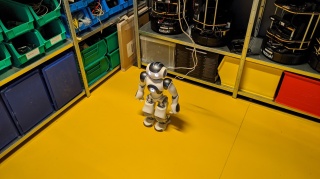How Digital Life and HBO-ICT continue to work together agile at a distance
14-04-2020

Our research group Digital Life has been working with the HBO-ICT program for the first-year student project PAD -'Project Agile Development'- since February 1. 2020. Mats Otten is the connecting link in this project, as he is both a lecturer at HBO-ICT and a researcher on 'Robotics in Healthcare' at Digital Life.
Of the current batch, 38 students are affiliated with this PAD project. In eight teams of 4 to 5 people, they worked with a (external) client to develop a service in which robotics in home care play the leading role. All students from the field of study 'Technical Informatics' have chosen for this project to work with our Digital Life research group as their client.
The aim of their assignment is to investigate how robots can be a means to reduce loneliness among people in care homes and to make them feel more comfortable. For example, a robot has been developed to play bingo, but also a robot that can act as an assistant and even a robot as a Tinder mediator for the residents of a care home!
In the PAD project, Mats Otten coaches four teams and also guides all eight teams with technical consultations.
Due to the current situation because of COVID-19, he and his colleagues have thought about how the collaboration and progress of the project can still be guaranteed. Since the beginning of April they have succeeded in placing one of the NAO robots - i.e. autonomous, programmable humanoid robots - at the faculty of HBO-ICT, with which the students now even learn to work remotely! A live stream has also been set up for this purpose, so that you can see exactly what students can do with the robot. For current results, take a look at their YouTube channel.
Thanks to the professional, smart use of technology for both education and research, the PAD project is still proceeding according to plan. At the beginning of April the student teams gave a presentation about their interim results via 'virtual classroom'. They also showed a demo using a virtual robot. The project is scheduled to be completed at the end of May, after which the students will be assessed digitally at the beginning of June.
Tribute to everyone involved!

